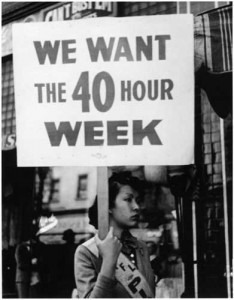I have had clients who were not paid overtime in Nebraska and they should have been. Ultimately, if an employee is not exempt from the Fair Labor Standards Act (FLSA) minimum wage or overtime provisions, these employees should be paid minimum wage and overtime if they work more than forty hours in a week.
Businesses that are faced with a lawsuit under the FLSA should keep in mind that many times these cases are filed on behalf of the named person bringing the lawsuit, as well as other employees similarly situated. These cases brought on behalf of a group are known as collective actions.
In a case decided on April 16, 2013, the United States Supreme Court determined what happens to such a lawsuit when the claims of the person bringing the suit become moot. Genesis Healthcare Corporation v. Symczyk, No. 11-1059 (Apr. 16, 2013). In that case, the employee alleged that her employer had improperly failed to pay her, and others, for time worked during breaks. Before any other employee joined the lawsuit, the employer offered to pay her the full amount of her claim. The employee rejected that settlement offer. The lower courts and the Supreme Court held that by offering to fully compensate the employee the employer had mooted her claim making her no longer eligible to seek relief for herself. The employee argued, however, that she was still entitled to pursue her lawsuit on behalf of fellow employees with the same types of claims.
 Although not all of the Supreme Court Justices agreed, the Court decided that the employee was no longer eligible to pursue claims on behalf of her fellow employees. Because no other employee had yet joined the lawsuit, the only live claim was that of the employee who filed the case. Once her claim was determined to no longer exist, the Court held that there was no longer any present claim remaining to resolve and decided that the whole case was properly dismissed. The Court indicated that the result would have been different if other employees had already joined the litigation before the filing employee’s claim became ineffective.
Although not all of the Supreme Court Justices agreed, the Court decided that the employee was no longer eligible to pursue claims on behalf of her fellow employees. Because no other employee had yet joined the lawsuit, the only live claim was that of the employee who filed the case. Once her claim was determined to no longer exist, the Court held that there was no longer any present claim remaining to resolve and decided that the whole case was properly dismissed. The Court indicated that the result would have been different if other employees had already joined the litigation before the filing employee’s claim became ineffective.
Four of the nine Justices dissented from the Court’s decision because they reasoned the employee’s own claim did not become ineffective merely because the employer made a settlement offer to pay her full claim. Justice Kagan’s dissenting opinion makes for a colorful read, in which she notes that the majority resolved only “an imaginary question.”
Nebraska businesses faced with lawsuits alleging FLSA violations, particularly those seeking collective action status, can involve complicated procedural issues. Nebraska employers should take care to consider pertinent strategic options, including potentially offering a settlement to the named plaintiff.
If you are a Nebraska business owner faced with an employment law claim, contact Madathil Law Office for a free consultation for guidance on how to respond to the situation.
Angela Y. Madathil
Madathil Law Office, LLC
Employment and Business Law
Serving clients in Omaha and Lincoln
In Omaha In Lincoln
1625 Farnam Street #830 285 South 68th Street Place, Suite 322
Omaha, NE 68102 Lincoln, NE 68510
T: 402.577.0686
No comments:
Post a Comment